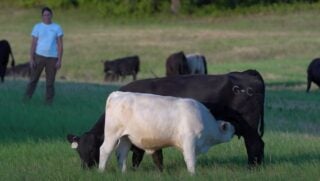We’ve always known there has been a great divide between celebrities and reality for most Americans, but I didn’t imagine the disconnect would stretch into the realm of agriculture as deeply as it has. Conversations on food are all the rage now, whether it’s the new “hipster” restaurant opening up for some nice Instagram shots, the new diet trend, or worse, the new fear-mongering campaign. We’ve seen that celebrities tend to keep the conversations going, but rarely in support of modern agricultural practices.
For example, have you seen that Kim Kardashian is the new spokeswoman for Beyond Meat?
View this post on Instagram
Just one of her advertisements likely reaches more people than I can educate in a month, and with over 320 million followers on Instagram alone, you know her endorsement didn’t come cheaply for Beyond Meat.
Maybe you even remember Burger King’s disastrous commercial that I helped completely dismantle. It’s rare that you find a notable advertisement for real meat or one that puts agriculture in a positive light. They’re few and far between — at least since the Sam Elliot Beef It’s What for Dinner commercials that are now decades old now. I can think of many advertisements for organic, non-GMO, or other specific food labels, but rarely for conventional products nowadays.
Why is there so much money being filtered into advertisements insinuating much the food in America is unsafe or of poor quality?
The problem is influence. Money talks, right? Celebrities, who too often live completely outside of reality, can afford the unrealistic lifestyle diets, prepared by private chefs, and literally served directly to them on a platter.
This is easily exhibited by the recent public mockery of Kendal Jenner (one of the Kardashian clan), who proved on her own television show she has absolutely zero idea how to even cut a vegetable to for a snack. This woman is 26 years old and couldn’t even cut a zucchini. Does that sound like a family that you should be taking food advice and information from? Probably not.
And then there’s Joaquin Phoenix and his 2020 Oscars speech on live television about artificial insemination in the dairy industry and outright lies of “stealing babies,” which shows that not only do many celebs not know about the food they’re eating, they definitely don’t know anything about how it’s being produced. (Go to the 3:40 mark below.)
So how do we combat this effort? Kim Kardashian likely doesn’t care all that much about what’s served on her plate each day, but she’s going to tell you what you should eat, simply because she’s getting a paycheck for it. We are but a small voice to their influence, power, and money.
Firstly celebrities who are supportive of today’s agriculture should stand up and speak up! There are a good number of celebrities who own agriculture operations across the world in a wide variety of industries. Russell Crowe and his 500-head cattle ranch in Australia; Chris Pratt and his sheep farm; Julia Roberts, Mark Ruffalo, Zach Galifianakis, and even Blake Shelton have had farms at various times.
Why don’t we see them posting about their farms and about agriculture? These voices could do great things.
There was some pushback when National Cattlemen’s Beef Association spent a good chunk of change on marketing campaigns with celebrities, but these campaigns are important. We need to find a way to get the word out in similar fashions as our competitors. If plant-based meat companies, non-GMO products, or organic labels are out there spending millions on marketing, shouldn’t we at least try to match their efforts?
Of course, you can make a difference too. Communicate with your friends, family, and on your social accounts to help combat these campaigns.
Michelle Miller, the Farm Babe, is a farmer, public speaker and writer who has worked for years with row crops, beef cattle, and sheep. She believes education is key in bridging the gap between farmers and consumers.



